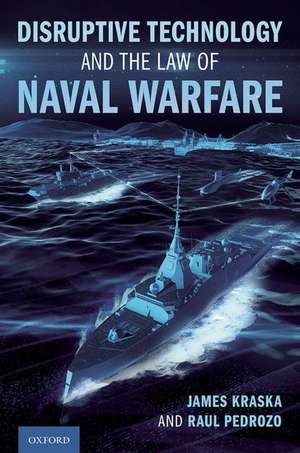Disruptive Technology and the Law of Naval Warfare
Autor James Kraska, Raul Pedrozoen Limba Engleză Hardback – 13 iun 2022
Preț: 558.74 lei
Preț vechi: 799.95 lei
-30% Nou
Puncte Express: 838
Preț estimativ în valută:
106.92€ • 114.33$ • 89.14£
106.92€ • 114.33$ • 89.14£
Carte disponibilă
Livrare economică 17-22 martie
Livrare express 12-18 martie pentru 130.12 lei
Preluare comenzi: 021 569.72.76
Specificații
ISBN-13: 9780197630181
ISBN-10: 0197630189
Pagini: 328
Dimensiuni: 243 x 162 x 29 mm
Greutate: 0.59 kg
Editura: Oxford University Press
Colecția OUP USA
Locul publicării:New York, United States
ISBN-10: 0197630189
Pagini: 328
Dimensiuni: 243 x 162 x 29 mm
Greutate: 0.59 kg
Editura: Oxford University Press
Colecția OUP USA
Locul publicării:New York, United States
Recenzii
This book is the definitive authority on approaching technological innovations that are already disrupting the traditional categories of actors and situations in the law of naval warfare. It should be required reading for all policy practitioners, government decision-makers, and international lawyers now wrestling with characterizing legal consequences from factual ambiguities introduced through "maritime militias," unmanned maritime systems, lethal autonomous warfare, and dual-use technologies.
Notă biografică
James Kraska is Chair and Charles H. Stockton Professor of International Maritime Law in the Stockton Center for International Law at the U.S. Naval War College and Visiting Professor of Law and John Harvey Gregory Lecturer on World Organization at Harvard Law School. A retired Navy Commander, he held numerous positions with the Fleet and in the Pentagon, including Director of International Negotiations on the Joint Staff.Raul Pedrozo is the Howard S. Levie Professor of the Law of Armed Conflict in the Stockton Center for International Law at the U.S. Naval War College and a retired Navy Captain. He served in numerous positions with operational forces and in the Pentagon, including Special Assistant to the Under Secretary of Defense for Policy, Principal Legal Adviser to U.S. Naval Special Warfare Command, and Principal Legal Adviser to Commander, U.S. Pacific Command.
